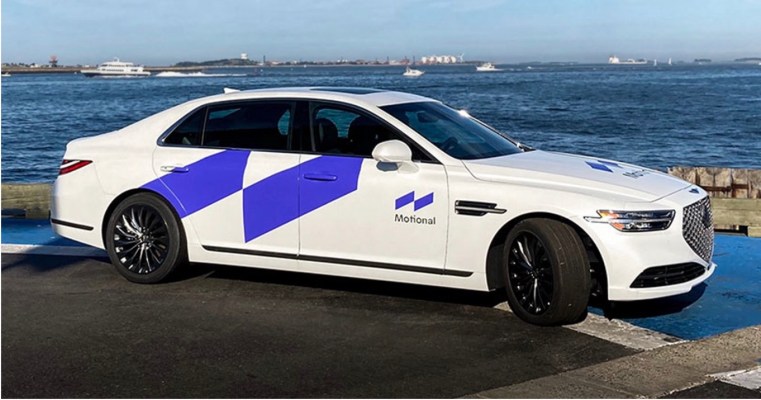
Motional, the Aptiv-Hyundai $4 billion joint venture aimed at commercializing autonomous vehicles, is preparing to roll out fully driverless vehicles on public roads in Las Vegas after receiving approval from the state of Nevada.
The company’s president and CEO Karl Iagnemma announced Tuesday in a blog post that the state has given permission to test its autonomous vehicles without a human safety driver behind the wheel.
That doesn’t mean these vehicles will be plying Las Vegas streets tomorrow. Iagnemma, whose AV startup nuTonomy was acquired by Aptiv in 2017 and has since evolved into the Hyundai joint venture Motional, said the company will spend the next several months completing what he describes as a “rigorous, self-imposed testing and assessment period.” That testing and assessment period, which is already underway, included studying the performance and safety of its vehicles on public and private roads. Based on that timeline, driverless testing on public roads will begin sometime in early 2021.
Iagnemma also noted that Motional was working with one of the “world’s most respected safety assessors.” The company didn’t name the safety assessor, but told TechCrunch more details of the safety and assessment progress would be revealed in the coming weeks.
Motional is no stranger to Las Vegas. As the Aptiv Autonomous Mobility Group, the company spent years testing its autonomous vehicles (with a human backup driver behind the wheel) in the city. The company launched in January 2018 a one-week program with Lyft to test a robotaxi service during CES, the large tech conference. That temporary experiment, which has always included a human safety driver, was extended and still exists today. As of February 2020, the program had given more than 100,000 paid self-driving rides in Aptiv’s self-driving vehicles per the Lyft app.
Aptiv’s investment in Las Vegas expanded as those ridership numbers grew. The company opened in December 2018 a 130,000-square-foot technical center in the city to house its fleet of autonomous vehicles as well as an engineering team dedicated to research and development of software and hardware systems, validation and mapping.
The fully driverless testing will be separate from the company’s self-driving fleet operating on the Lyft network in Las Vegas, according to Iagnemma.
Since its joint venture with Hyundai, the newly branded Motional company is stepping up its efforts in Las Vegas as well as other U.S. cities like Pittsburgh and international locations, including Singapore and South Korea. The aim, Iagnemma says, is to create AV technology that can navigate a wide range of international road environments, including left-hand and right-hand drive, harsh sun and heavy rain, highways and city streets, roundabouts and uncontrolled intersections.
What is unclear is where these driverless vehicles will operate and when Morional might make them accessible to the public. If Motional follows the lead of Waymo, which has started to scale up a driverless service in the Phoenix area, the process will be slow and likely in the testing phase for months.
Another unknown is whether Motional will partner with Lyft or another company to operate a driverless service. Last month, Motional and on-demand shuttle startup Via announced plans to launch a shared robotaxi service for the public in a U.S. city in the first half of 2021. The companies said at the time that the aim is to develop a “blueprint” for on-demand shared robotaxis and learn how these driverless vehicles can be integrated into mass transit. The partnership with Via will begin with autonomous vehicles with a human safety driver behind the wheel.
The details on this partnership and the service were scant. Motional and Via didn’t identify the city, provide information on the geographic scope of the service or number or type of vehicles that would be used. The companies did say that the service will be launched in one of the U.S. cities where Motional already operates, narrowing down the possible list to Boston, Pittsburgh, Las Vegas and Santa Monica.



